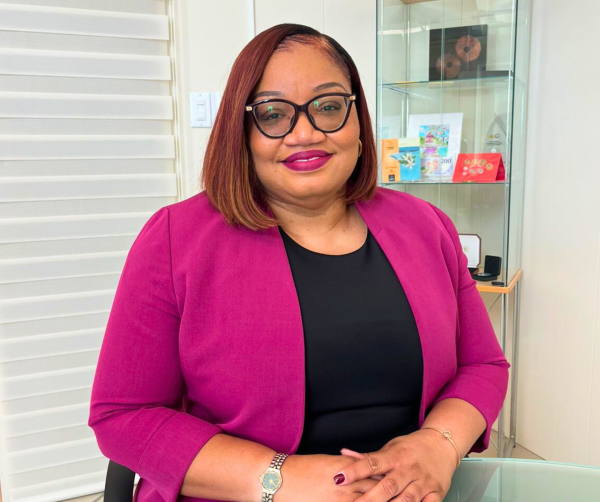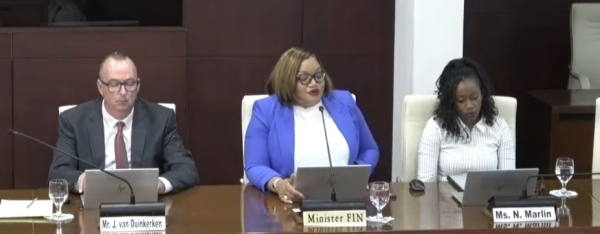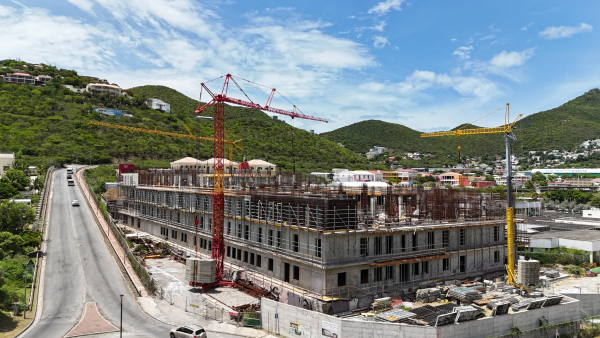 PHILIPSBURG:--- At Monday’s Central Committee meeting of Parliament, Minister of Finance Marinka Gumbs delivered a compelling address on St. Maarten's role within the monetary union with Curaçao. Her remarks came amidst growing public discourse and statements from Curaçao’s Acting Minister of Finance, Mr. Cooper, suggesting a potential separation of the two countries within the union.
PHILIPSBURG:--- At Monday’s Central Committee meeting of Parliament, Minister of Finance Marinka Gumbs delivered a compelling address on St. Maarten's role within the monetary union with Curaçao. Her remarks came amidst growing public discourse and statements from Curaçao’s Acting Minister of Finance, Mr. Cooper, suggesting a potential separation of the two countries within the union.
Minister Gumbs firmly stated, “St. Maarten is not a liability to anyone. We are an autonomous country within the Kingdom and an equal partner in this union.” She emphasized that cooperation between the two nations must be rooted in mutual respect, not dependency or superiority. While acknowledging the historical necessity of the monetary union, she made it clear that St. Maartin’s future course would be determined by legal analysis, economic stability, and the best interests of its people.
The Minister addressed the importance of unity between government and Parliament, particularly in matters of economic and financial stability. “When government and Parliament speak with one voice, we strengthen our negotiating position. When we stand divided, we weaken our leverage,” she said, urging for a cohesive approach to safeguard the country’s financial future.
Minister Gumbs also highlighted the strategic importance of the five harmonized national ordinances on financial supervision currently under discussion in Parliament. These laws, she explained, are not about union politics but about protecting St. Martin’s economic and financial stability. “These laws align our supervisory framework with international standards. They strengthen our compliance architecture, safeguard our banking and financial institutions, and protect St. Martin whether we remain in the union or whether the future structure of the union changes,” she stated.
In response to recent statements from Curaçao’s Acting Minister of Finance, Minister Gumbs clarified that such remarks are for Curaçao’s account and do not dictate St. Maarten’s position. “Stability requires preparation, strategic assessment, and alignment between government and Parliament,” she said, adding that any assessment of the monetary union’s future must be coordinated and rooted in national interest.
Minister Gumbs concluded her address by reiterating the importance of passing the proposed financial supervision laws. “Preparation is not panic. Compliance is not weakness. Institutional strength is not political theater. It is responsible governance,” she declared, underscoring the need for St. Maarten to remain aligned with international standards to protect its economic and financial stability.
 PHILIPSBURG:--- The Parliament of Sint Maarten recently began deliberations on five draft national ordinances aimed at modernizing the country’s financial supervision framework. These laws, presented by Minister of Finance Marinka Gumbs, are designed to align Sint Maarten with international standards and ensure compliance with the Financial Action Task Force (FATF) recommendations.
PHILIPSBURG:--- The Parliament of Sint Maarten recently began deliberations on five draft national ordinances aimed at modernizing the country’s financial supervision framework. These laws, presented by Minister of Finance Marinka Gumbs, are designed to align Sint Maarten with international standards and ensure compliance with the Financial Action Task Force (FATF) recommendations. PHILIPSBURG:--- At Monday’s Central Committee meeting of Parliament, Minister of Finance Marinka Gumbs delivered a compelling address on St. Maarten's role within the monetary union with Curaçao. Her remarks came amidst growing public discourse and statements from Curaçao’s Acting Minister of Finance, Mr. Cooper, suggesting a potential separation of the two countries within the union.
PHILIPSBURG:--- At Monday’s Central Committee meeting of Parliament, Minister of Finance Marinka Gumbs delivered a compelling address on St. Maarten's role within the monetary union with Curaçao. Her remarks came amidst growing public discourse and statements from Curaçao’s Acting Minister of Finance, Mr. Cooper, suggesting a potential separation of the two countries within the union. Willemstad/Philipsburg:--- The Centrale Bank van Curaçao en Sint Maarten (CBCS) announces the appointment of Ms. Nicole Marlin as Director of its Sint Maarten office, effective April 1, 2026. The appointment follows a careful recruitment process undertaken in consultation with the Supervisory Board.
Willemstad/Philipsburg:--- The Centrale Bank van Curaçao en Sint Maarten (CBCS) announces the appointment of Ms. Nicole Marlin as Director of its Sint Maarten office, effective April 1, 2026. The appointment follows a careful recruitment process undertaken in consultation with the Supervisory Board. PHILIPSBURG:--- What was once heralded as a beacon of progress for St. Maarten has become a festering symbol of fiscal irresponsibility and deliberate obscurity. The New General Hospital project is no longer just delayed; it is a runaway train of unchecked spending and insulting silence from the very officials elected to serve the public interest. While the government remains tight-lipped, the bill for taxpayers continues to climb staggering new heights.
PHILIPSBURG:--- What was once heralded as a beacon of progress for St. Maarten has become a festering symbol of fiscal irresponsibility and deliberate obscurity. The New General Hospital project is no longer just delayed; it is a runaway train of unchecked spending and insulting silence from the very officials elected to serve the public interest. While the government remains tight-lipped, the bill for taxpayers continues to climb staggering new heights.